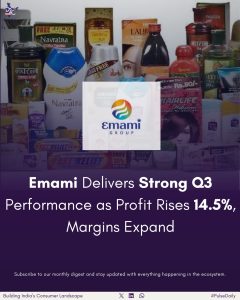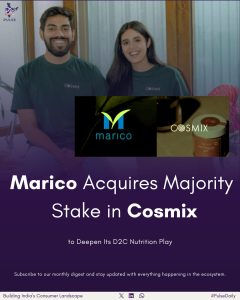Himalaya Wellness, a well-known wellness brand, is adapting to India’s rapidly changing direct-to-consumer (D2C) market. They’re keeping up with Gen Z’s preferences by updating their popular Neem product line and focusing on online engagement, quick commerce, and new premium products.

For over 20 years, Himalaya’s Neem face wash has been key to their skincare business, making up over 30% of their consumer product sales. Now, with more competition from new D2C beauty and skincare startups in India, Himalaya has improved its Neem formula, expanded the product line, and plans to launch a Neem serum. Rajesh Krishnamurthy, Business Director, said that this update aims to help young people tackle pimples using both scientific and Ayurvedic methods, which aligns with current trends in Ayurvedic D2C products.
Since only 25-30% of people in India use face wash, there’s room to grow. Himalaya currently holds a 20-30% market share and wants to increase it by 3-4% in the next 2-3 years. This goal is part of a wider D2C growth plan in the Indian market, where established companies are changing their strategies to compete with newer D2C startups and fast-growing brands.
Himalaya is also focusing on premium products. Besides Neem, they’re entering higher-end categories with new products like Turmeric face wash for dark spots, Vitamin C products for brightening, Aloe Vera lines, and skincare specifically for men. With premium D2C brands gaining popularity in major cities, Himalaya wants to be seen as both an accessible brand and a competitor in sustainable D2C brands and wellness startups with appealing products.
Himalaya’s distribution is strong, with their Neem range covering 95% of the market, but they recognize the importance of online sales. E-commerce already accounts for 12-14% of their business, with quick commerce becoming the fastest-growing channel, making up almost 30% of online sales. Krishnamurthy noted that quick commerce is valuable for both convenience and launching premium products, as consumers in big cities are willing to pay more for fast delivery, making it a good way to test and expand new products.
Himalaya is also increasing its focus on influencer-led campaigns, scientific credibility, and purpose-driven stories to connect with Gen Z, who value the opinions of their peers more than traditional advertising. This change reflects trends in the D2C industry, where influencer marketing is key to growth and brand stories focus on authenticity and community.
With a range of products spanning baby care, personal care, skincare, and healthcare, Himalaya Wellness is revising its D2C strategy in India. In a competitive market filled with celebrity-backed and creator-led D2C brands, Himalaya is using its strong reputation while being as adaptable as a new startup. This shows the current state of India’s D2C market, where established trust, modern consumer insights, and online-focused growth strategies come together.
As investors watch D2C funding rounds, venture capital-backed brands, and potential IPOs, Himalaya’s updated approach shows that established companies can grow alongside new disruptors in 2025. For those following the Indian D2C market, Himalaya’s Neem update, quick commerce strategy, and premium product focus confirm its position as a top-performing D2C brand in FY25, combining Ayurvedic trust with the desires of Gen Z.








